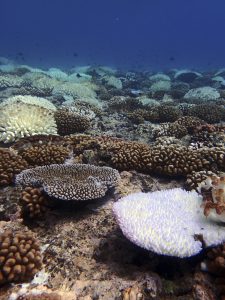
Anthropogenic climate change is challenging wild population to adapt and acclimate at increasingly rapid rates. Keystone marine species, like reef-building corals, are struggling to keep pace and populations are declining at unprecedented rates, threatening important ecosystem functions that coral reefs provide. However, resilient individuals from extreme environments may contribute to the survival of subsequent generations through the transfer of heritable heat tolerance, but human intervention is likely required to harness this adaptive potential to content with current warming trends. There is therefore an essential need to understand how to leverage these resilient individuals to enhance the adaptive capacity of these keystone species.
In 2019, the French Polynesian island of Mo’orea experienced a severe mass bleaching event accompanied by widespread coral mortality. At the most heavily impacted sites, we observed Acropora hyacinthus individuals that were resistant to bleaching, alongside colonies that bleached but showed signs of symbiont recovery shortly after the bleaching event. Using these colonies as a natural experiment, we are assessing energetic and reproductive consequences of these different responses to heat stress. Further, we are examining the potential for symbiont communities, host genotype and epigenetics to have contributed to survival and recovery of extreme stress event. This work will be important for understanding mechanisms of resiliency in Moorea’s coral reefs.
